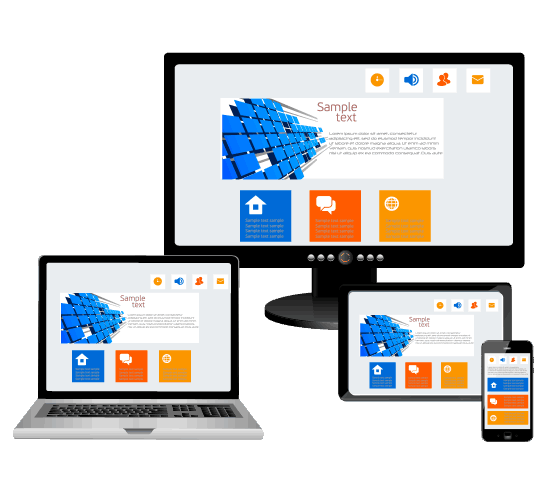Mobile Responsive Web Design
Web Pages Should Fit All Screens
 We're not going to bore you or waste your time with a long explanation about the history and evolution of computer screens, their sizes, shapes, resolutions, etc. There are plenty of other websites out there that can do that for you. But if you've been awake during the past 10-15 years, you're aware of how far and how fast screen technology has been advancing, and of the increasingly common usage of mobile devices by people of all ages to access the internet.
We're not going to bore you or waste your time with a long explanation about the history and evolution of computer screens, their sizes, shapes, resolutions, etc. There are plenty of other websites out there that can do that for you. But if you've been awake during the past 10-15 years, you're aware of how far and how fast screen technology has been advancing, and of the increasingly common usage of mobile devices by people of all ages to access the internet.
A Pew Research Poll indicated that "as of May 2013, 63% of adult cell owners used their phones to go online, and 34% of cell internet users went online mostly using their phones, and not using some other device such as a desktop or laptop computer."
Another Pew Research Survey completed in November 2014 and published in April 2015 indicated that 89% of cell phone users accessed the Internet on their phones.
In other words, if your website is not easily usable by people on cell phones and other mobile devices like iPads and tablets, you are losing customers. Even if you don't access the internet very often on mobile devices, chances are that many of your potential customers DO. Give them an easy, pleasant experience on your site no matter what device they use, and they're much more likely to become customers.
Mobile-Friendly Websites Rank Higher in Google
Straight out of Google's Official Webmaster Central blog:
Starting April 21 [2015], we will be expanding our use of mobile-friendliness as a ranking signal. This change will affect mobile searches in all languages worldwide and will have a significant impact in our search results. Consequently, users will find it easier to get relevant, high quality search results that are optimized for their devices.
What Does That Mean?
It means that Google is giving higher weight in search rankings to websites that are mobile-friendly. If your site is not mobile friendly, that has a "significant impact" (Google's own phrase) -- and you can bet it's not a positive impact! -- on where your website appears in search result listings.
Are Mobile-Friendly and Mobile Responsive the Same?
A Mobile Responsive Website actually encompasses two elements: Mobile-Friendly and Responsive.
- MOBILE-FRIENDLY means that no matter what device the website is viewed on, whether it be the smallest cell phone screen or the largest computer monitor screen, the website fits the screen in an easy to read, easy to use manner. That means the content is large enough to read without requiring the user to pinch in or pinch out on touch screens, or do any scrolling for width on any screens at all. It also means that every web page's links, buttons, menu items, and other elements can be clicked easily with the average user's finger; and that every other interactive element such as form fields are also easy to work with on every size screen, including small mobile devices.
- RESPONSIVE means that the website content is fluid, that is, it can automatically respond according to what size screen is being used to view it, and adjust itself to fit as closely as possible that screen size.
Aren't they the same?
No. Not all mobile-friendly sites are responsive, and not all responsive sites are mobile-friendly. A mobile-friendly website just means the web site's content can be read and manipulated on a mobile device.
A decade ago, the most common way of making a website "mobile-friendly" was to just create specific pages or even a whole different website using a different layout and then use old-fashioned browser detection to redirect visitors using mobile devices to those pages. But nowadays that method presents problems of its own:
- It requires extra expense and effort to create and maintain the additional mobile friendly web pages.
- Although Google does not currently reduce search ranking for sites that are made "mobile-friendly" by using redirects, Google does specifically discourage that method in an official Google "best practices" article they have written for webmasters, "What are the Top 3 Mistakes Beginners Want to Avoid?"
- When Google discourages a practice (see above), it usually means that if not already, then in future search algorithm updates, this practice may result in down-ranking in search results for websites that use it.
How We Can Help
-
Mobile Responsive Web Design
If you hire 12Wonder to design and develop your website, be assured that it will be both mobile friendly AND responsive, according to the highest professional standards in web design.
-
Make Old Websites Mobile Responsive
12Wonder can also do website conversions to make existing web sites mobile friendly and responsive. Depending on various factors, this is often more cost effective than a complete redesign of the site.




